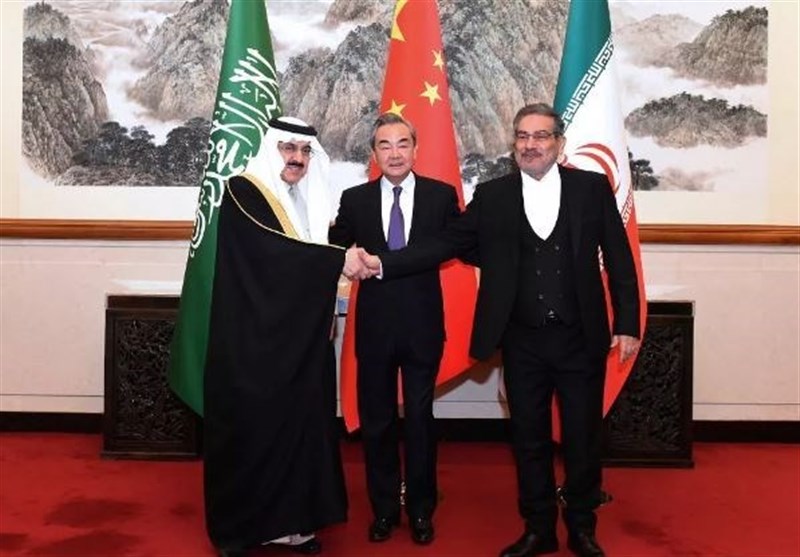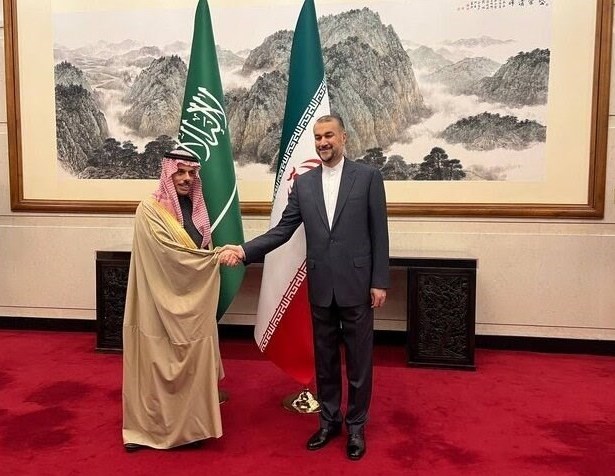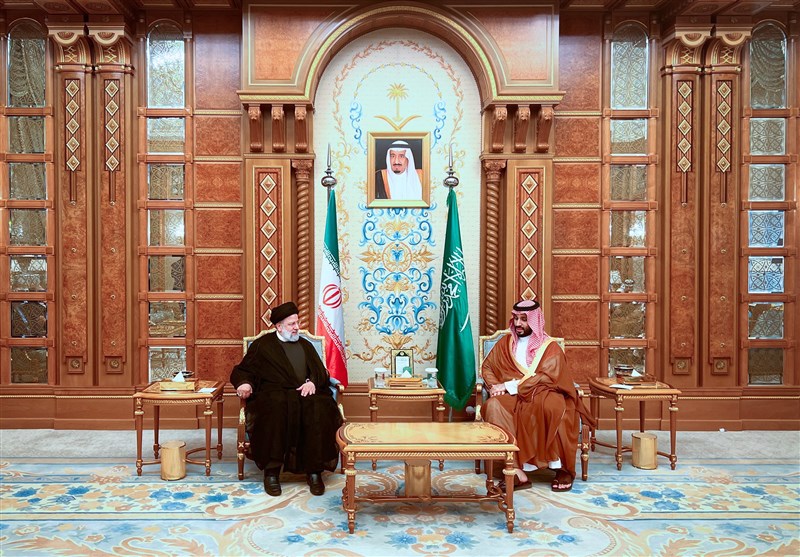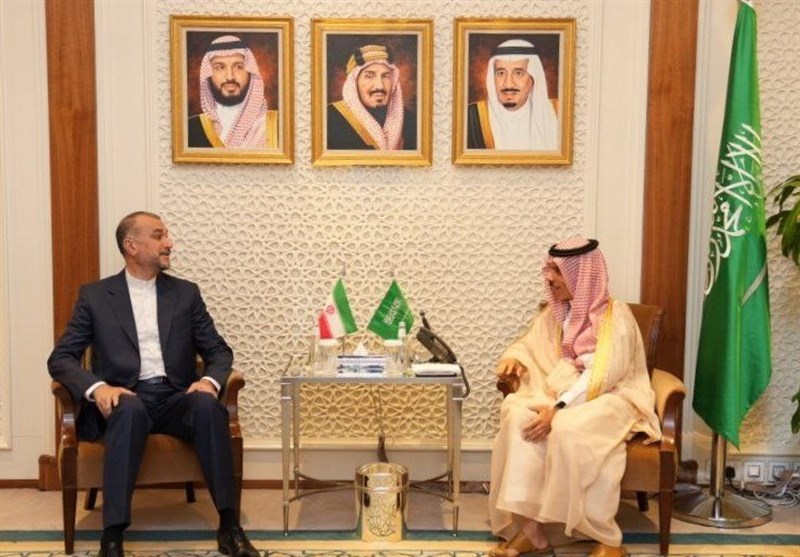Iran’s ambassador to Saudi Arabia: the collective cooperation program of the 8 countries of the Persian Gulf
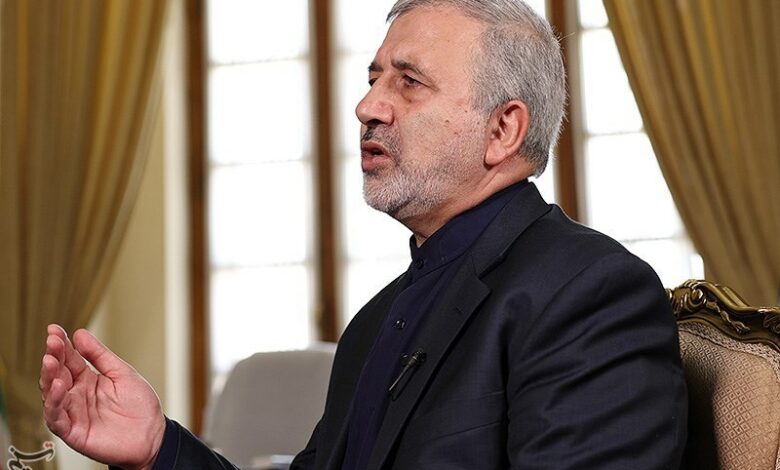
| On the occasion of the first anniversary of the reopening of the embassies of Iran and Saudi Arabia, the Iranian ambassador to Saudi Arabia emphasized the impact of the development of relations between the two countries on the process of regional cooperation and said: steps have been taken for the cooperation of the eight countries of the Persian Gulf as a collective cooperation. |
According to the foreign policy reporter of Tasnim news agency, today June 16 is the anniversary of the official reopening of the Embassy of the Islamic Republic of Iran in Saudi Arabia. It was on this day that the Iranian embassy was reopened after 7 years of no political relationship between Tehran and Riyadh in the presence of Alireza Beikdali, Deputy Consular Minister of Foreign Affairs, and Hassan Zarnagar Abargoui, Consul General of Iran in Jeddah.
The senior security officials of Iran and Saudi Arabia signed a tripartite statement in Beijing on March 10, 2023, during which the Islamic Republic of Iran and the Kingdom of Saudi Arabia agreed to resume diplomatic relations within two months at most. and reopen embassies and agencies.
The two countries, emphasizing respect for sovereignty and non-interference in each other’s internal affairs, in the context of the implementation of the security cooperation agreement signed in 1380.1 28 Khurshidi, equal to April 17, 2001, as well as the general agreement on economic, commercial, investment, technical, scientific, cultural, sports and youth cooperation, signed on March 6, 1377, equal to May 27, 1998.
Following the resumption of relations between Iran and Saudi Arabia, the two countries decided to send their ambassadors to Tehran and Riyadh as soon as possible, and in this context, the Iranian government, Alireza Enaiti, the director general of the Gulf Fars introduced the Ministry of Foreign Affairs as its ambassador in Riyadh, who was present during the two years of negotiations between Iran and Saudi Arabia to resume relations, and Saudi Arabia chose Abdullah Al-Anzi as its ambassador.
Since the resumption of relations between the two countries, there have been many cases and issues, both in the discussion of bilateral relations and in the region, which The two countries tried to achieve them in the shadow of joint cooperation and continuous consultations. We witnessed bilateral cooperation and consultations in topics such as Hajj Tamattu, Hajj Umrah, cultural, sports, economic diplomacy, as well as the Palestinian issue. Saudi Arabia in various areas and the future horizon of these relations, as well as the agreements made between the two countries, we had a conversation with Alireza Enaiti, the ambassador of the Islamic Republic of Iran in Saudi Arabia.
The description of this conversation is as follows:
Tasnim: This year is the first anniversary of the reopening of the Iranian embassy in Saudi Arabia. What thought and issue made the two countries resume their relations after several years of no political relations? In this regard, how do you see the role of Martyr Raisi and Martyr Amir Abdollahian, both in the negotiations before the restoration of relations and after the restoration and strengthening of relations?
Enaiti: Today, June 16, one year since the official reopening of the Embassy of the Islamic Republic of Iran in Riyadh and June 17, one year since its reopening The Consulate General of Iran is located in Jeddah and this reopening was due to the agreement of the two countries on March 10 and April 6, when the parties agreed to resume relations within two months. Among these matters was the reopening of the embassy and the exchange of ambassadors, which fortunately, the Iranian embassy and consulate general in Saudi Arabia was reopened within the expected period, and the Saudi embassy and consulate general in Tehran and Mashhad after a while.
We have passed one year since the opening of the embassy. In the past one year, relations between Iran and Saudi Arabia progressed correctly and precisely, and we saw its benefits on a bilateral level and in other dimensions. Naturally, the main role to follow this path, which is to try and talk for an agreement between Iran and Saudi Arabia and bring their views closer to each other, was established two years ago and the Baghdad talks were formed.
These talks continued in Muscat as well. The inauguration of the late President Ayatollah Raisi and the formation of the 13th government was accompanied by an important title and an obvious sign called the principle of neighborliness or the policy of good neighborliness, and this matter was repeatedly stated by Mr. President and followed up by the Ministry of Foreign Affairs. Its creator was the late president and its executor was the late foreign minister. During the talks held in Baghdad and Muscat, the parties reached an agreement in Beijing. The agreement was finally announced on March 10 with the management of the meetings and the chairmanship of the secretaries of the Supreme National Security Council of the two countries. The parties agreed to resume relations.
On April 6, the foreign ministers of the two countries officially announced the resumption of relations. In this way, the talks between Iran and Saudi Arabia were able to reach a conclusion after about two years of talks in Beijing, and the parties put their relations on the normal track. Iran has always considered relations with its neighbors and the development of relations with its neighbors and deepening of relations as a basic principle for itself, and considered the termination of relations as a temporary element on relations. In this sense, the essence of relations or the nature of relations with neighboring countries is the development and consolidation of these relations, and thanks to God, these relations were resumed with the talks held by the parties as two important countries in the region and the Islamic world.
Tasnim: Some still believe that Saudi Arabia From restoring relations with Iran, it is only looking to solve part of its own security problems and does not think about expanding it, but in the meantime, we witnessed the progress of the relations between the two countries in some cases, including regional issues, Hajj and the sending of pilgrims. Good steps have been taken. Do you agree with the statement that Saudi Arabia restored relations for its own security?
Enaiti: Iran and Saudi Arabia and basically every country follow and form actions to secure their own interests first. Of course, to the extent that the benefits are defined jointly and with the algebraic sum of these benefits, these benefits will be more stable. We have made great progress in the field of bilateral relations. Numerous delegations were exchanged between the two countries and each of the parties participated in the summits and meetings of the other side and were able to have meetings with the officials of the other side on the sidelines of these meetings. In this way, the coming and going between the two countries is fully provided in the form of regional and international meetings, and over the past year, more than 20 delegations have been exchanged between the parties.
The form of this exchange was multilateral meetings, but on the sidelines of these multilateral meetings, bilateral meetings were also held, and the last one was the meeting of the Minister of Economy and Finance of our country with the Minister of Economy and Planning of Saudi Arabia. have been. Also, Umrah flights have been established between the parties and our Umrah pilgrims managed to perform Umrah after 9 years. The place of Iranian pilgrims was completely empty and this process resumed. Specifically, after Hajj operations, Umrah flights can continue.
Several dimensions have been established for the relations between Iran and Saudi Arabia. Among other things, in regional and international organizations, the parties had continuous consultations with each other. Among other things, there was a very good and favorable cooperation between the two countries on the issue of Palestine, and meetings were held between the late president and Emir Mohammed bin Salman, the crown prince of Saudi Arabia, as well as the foreign ministers of the two countries, in which, in addition to emphasizing the important issue of Palestine and the necessity of Defending the rights of the Palestinian people, these bilateral issues were discussed and the determination of the parties to develop these cooperations was emphasized.
We also saw openings at cultural levels. The night of Iranian music was held in Riyadh on 22 Bahman with a delegation from Iran. In any case, there are different dimensions for this relationship. security, military, political, economic, commercial, cultural, consular, public, etc. dimensions and we hope that these relations will grow and continue in a balanced way between the parties.
> gone? Previously, the volume of trade between the two countries shows a low volume, will this volume of exchanges increase? Specifically, what agreements have been made regarding maritime transport, transit and investment?
Enaiti: In our economic sector, compared to other sectors, we need more efforts to witness positive economic indicators between the two countries along with other areas. In this regard, continuous discussions and consultations have been held between the two countries. We signed the comprehensive economic cooperation agreement between the two countries in 2017 and the agreement is still valid and contains specific issues in various economic dimensions. In the talks with the Saudi side, we emphasized the activation of this agreement in the Beijing one and two summits. Other agreements have been signed between Iran and Saudi Arabia, such as air transportation, and other basic agreements have been exchanged between the parties, and we hope that by emphasizing these agreements, we will see the development of economic and commercial relations between them.
Among the important issues that can shape the sphere of economic relations between Iran and Saudi Arabia is the issue of transit, and Iran as the crossroads of Asia from south to north to north-south corridors And the Ashgabat agreement is the route connecting the south and the north and the east and the west. Let me remind you that Saudi Arabia has a foundation for cooperation with the Central Asian region and has put this on its agenda. The transit of goods, logistics and services can take place in this safe route and the countries of Central Asia and the Caucasus can reach the Persian Gulf and the Sea of Oman from the north of Iran. Saudi Arabia and other countries of the Cooperation Council also reach Central Asia and the Caucasus in the south of Iran.
Tasnim: Regarding consular cooperation, What measures have been taken regarding the arrival of citizens of the two countries and the resumption of direct flights between the two countries? We saw that pilgrim flights were carried out in the discussion of Hajj. Will these flights remain only in this issue or will permanent and specific flights be established?
Enayiti:The issue of resuming direct flights during this period is on the agenda of the two countries and talks have been held in this regard based on the agreed activation of air transportation. With the activation of this agreement, we hope to return to the previous years when there were direct flights between the cities of Iran and Saudi Arabia. These talks have started and are continuing and can reach a favorable result in the future. We currently have direct Hajj flights and Umrah flights between the two countries, and we hope that scheduled flights will help the movement of the citizens of the two countries by respecting all aspects, and in the joint statement of the foreign ministers of the two countries in Beijing 2 The subject of the resumption of flights has been mentioned. We were the country. From holding the meeting of the Organization of Islamic Cooperation and bilateral consultations to the visit of the president to Riyadh and the conversation with the crown prince of this country. In this regard, what specific cooperation has been done between the two countries? What issues were discussed in the consultation between the heads of the two countries?
Enayati: The consultation and consensus of Iran and Saudi Arabia on the issue of Palestine, which led to the formation of numerous summits, including the Islamic and Arab summits, put the issue of Palestine at the top of global issues politically, regionally and internationally. And made it as a public demand. In this way, with the cooperation of the two countries and the serious entry of the Organization of Islamic Cooperation, the issue of Palestine is still considered as the first issue of the Islamic world, and it was able to present this Palestinian cooperation in the international community as a symbol of oppression, and international assemblies or countries that are against The crimes of the Israeli regime were sitting quietly, forcing them to react. In such a way that all over the world everyone supported Palestine. This caused Palestine to become not only an Arab and Islamic issue, but also a human and global issue. Both in Iran and Saudi Arabia and on the sidelines of international meetings, including the Banjul meeting in Gambia, the parties emphasized the issues of peace, stability and security in the region and discussed bilateral discussions in detail. The determination of the parties to develop these relations in order to secure the interests of the government and the people of the two countries is quite noticeable, and what we are witnessing is also indicative of the implementation of the views of the two countries in this regard.
Even after the martyrdom of the late president and foreign minister, this issue remains on the agenda of the two countries to develop relations. In the phone call between the Crown Prince of Saudi Arabia and Mr. Mohammad Mokhbar, in this call, the parties expressed their determination to develop relations and said that they will continue this way. Although the founders of this plan and the implementers of the neighborhood plan or the founders of this idea are not among us, they left a precious legacy for us and this way will continue.
Tasnim: One of the most important issues is the issue of regional cooperation. Now we are witnessing cooperation between the two countries in the region, especially after the Al-Aqsa storm. To what extent were the two countries able to play an active role in the discussion of regional order? 8-way cooperation was supposed to be formed in the Persian Gulf. Have the two countries taken any measures in this regard? The development of relations between Iran and Saudi Arabia will definitely affect the process of regional cooperation and the positive development of regional variables, and the parties will have a larger area for this cooperation beyond bilateral cooperation. We are thinking about an all-round and development-oriented cooperation. We emphasize on an endogenous security based on the internal powers of the countries of the region. We mention the development of people-to-people relations and travel and consider it as a serious basis for bilateral relations. We are looking forward to the cooperation of the 8 countries of the Persian Gulf as a collective cooperation and steps have been taken for talks. They put forward the idea of a regional dialogue forum including 8 countries, which attracted the attention of the countries. The ambassadors of 8 countries held a meeting at the United Nations and the idea of regional cooperation has always been of interest to the Islamic Republic of Iran. Recently, the Persian Gulf Cooperation Council has presented its own view on the security of the region and we hope that the eight countries will hold frank and honest talks with each other without excluding any countries or without adding foreign elements. and a new type of security that is based on the internal capabilities and facilities of the countries and provides the interests of everyone and the legitimate interests of the international community, they can start dialogues with each other and continue to strengthen the fields of cooperation. This is what the Persian Gulf region needs and we hope to see these talks soon.
end of message/
| © | Webangah News Hub has translated this news from the source of Tasnim News Agency |
[is_logged_in] Link [/is_logged_in]
|


